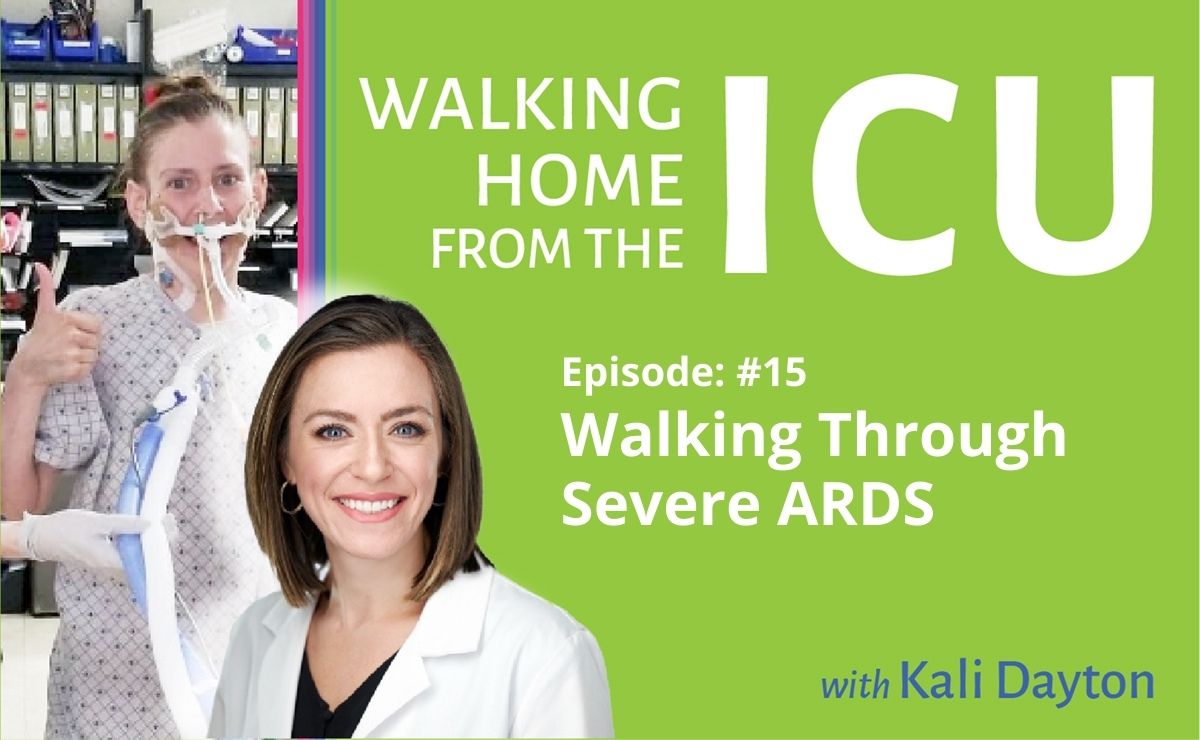SUBSCRIBE TO THE PODCAST
Bryan Carter shares his story about being admitted for severe pneumonia that became severe ARDS, how he was allowed to be awake and walking on the ventilator until he was proned and how his treatment impacted his outcomes.
Episode Transcription
Kali Dayton
Brian Carter is an ARDS survivor. He was admitted for speared streptococcal pneumonia and Coronavirus that quickly turned into severe ARDS. For the first stretch of his ICU stay, he was awake and walking on the ventilator. Even as the ventilator settings increased. By the time he reached a PEEP of 20 and Fi02 100%, he struggled to oxygenate, and he was informed that he would need to be prone, sedated and paralyzed. This lasted 48 hours.
And when he was tolerating supine again, he was just as quickly standing at the bedside, and soon after- walking. He was intubated for a total of 12 days, and never stopped being able to walk. He was successfully extubated, and was even strong enough to eat the day after. When he left the ICU, he was walking 1000 feet at a time. He passed cognition tests with flying colors, walked out of the hospital and went straight home. He is with us now to give us an inside look into what it was like to walk his way through ARDS and what his life is like now. And I just feel honored to be sitting with Brian in his office talking about what he experienced a year ago. Brian, thanks for joining us.
Bryan Carter
Thank you. It’s good to be here.
So you are one of the few people that can tell us what it was really like to be awake on the ventilator. What was that like?
It was it had its pros and its cons. It’s It was great to be able to breathe, for one. It was great to be able to know what was going on around me even though some of them I’m not sure I really wanted to know. There’s a lot of things that go on in the hospital that sometimes you don’t want to see. The number of machines I had hooked to me was, as a network engineer, I was impressed with the machinery that I had in there.
The good thing for me, of being awake on the ventilator ventilator was that I could communicate. I think one of the things that the hospital actually had a little bit of a challenge was the fact that I could communicate or that I wanted to communicate, took them a little while to figure out ways to allow me to communicate, since I couldn’t talk with the ventilator. I’ve got notes, notepads, and everything. In one room, they had a board where I could point out the letters and everything. But it was, kind of like my wife said, it was it was good to be able to communicate with her and be able to make decisions. together instead of somebody making them for me. The biggest thing, bad part about it, I couldn’t talk, I couldn’t eat, I couldn’t drink. One of the challenge, the biggest challenges that I had that was not being able to drink, they actually got to a point where they were able to simulate drinking for me by putting cold ice in my food tube.
I remember that. I remember ordering that and wondering, “I wonder if this will work”… And I don’t know how to put that in the computer as an order.
For some reason, I figured out that if I if they put ice cubes or crushed ice, cold water crushed ice as the last thing they fed me, even though I wasn’t actually swallowing it, you know, because they were using a feeding tube. It felt like I was and it gave me that satisfaction of you know, swallowing something something cold and liquid in my mind that that worked. So and they’re not every nurse would do it. I had to convince a few of them to okay, you know, listen to what I’m telling you just do it this way. And someone would say I don’t know if I can do that as well the last three have done so usually convince them to do it.
But that takes a lot of scribbling on a pad of paper to to convince them to do that. I also learned that not every nurse knew the same sign language that I had come up with. I told my wife that I wanted to come up with a set of gestures that she understood. Yeah, I’ve written all this down. And we never did, we never did successfully do that. So every time a different nurse would come in, I would have to learn a different way to communicate with them. That was all, that was a little bit frustrating.
But at the same time, I had the chance to communicate with them, which looking back I built some relationships with the nurses and nursing staff and even the doctors over that stay. The you know, they’re probably not lasting lifetime relationships, but they were relationships that were important. While we were there, I got to know their personalities a little bit, I got, you know that some of them would treat me a certain way. And they be they have fun with me. And they, you know, they tease me, I tease them. Ya know, if I had been sedated during that process, I wouldn’t have had any of that, it would just be a big blank.
But I can specifically remember certain things that went on between me and the nursing staff that kept me kept me feeling like I was going to be okay. There was never a time in there and all of the experience that I was led to believe that I was going to die there. And for me, that made me want to do the things that I needed to do to get out of there.If I if someone would have told me that, you know, the odds of me coming out of there and living a normal life again, or 5% or 10%, or whatever they are. That might be where I would be but I never knew that.
Kali Dayton
So you weren’t consumed with anxiety. Did you have pain?
Bryan Carter
I had some pain. I mean it but it was manageable pain was, I had pain. I’ve always had problems with my back, and I’ve got a spot in my leg that got some neuropathy. Things like that I would have pain at night, and things like that. Never anything that I don’t think they ever felt like they needed to give me pain medicine for. It was, you know, that we could usually control it with ice or, or something. I know there was one point in time where I asked my wife if she thought my chiropractor would come in to the hospital of adjustment back because as part of my back that was really bothering me. But that was all associated with just laying in bed. As long as I was in bed for the different angles that they had me.
Do you feel like walking and being able to the chair helped at all in this moment?
I think it helped. There’s kind of a there’s good and bad about the the walking and some of the challenges of the walking. When I when I first got in the hospital, after they intubated me, there was a gentleman nurse, and he was pestering me to get up for a walk. And he was pestering me. I did not fully like him. And he said some things that I know I know looking back what he said he was he was trying to encourage me through negative messages, I guess you know, if you don’t do this, then this if you don’t do this.
Here we are walking in and it annoyed me and it got to a point where I was tired of him and how long to go away so I I grabbed my stuff, And I turned over the edge of the bed I stood up and I’m here I was on the ventilator and everything and I’m like “Okay, let’s go”. And he had he had to stop “Wait, wait, wait, wait, wait, we’re not ready for you. We’re not ready for you” because I guess they were expecting that it was going to take them half an hour. And they were gonna have to get all this stuff lined up. Right so he was going to start early and what he annoyed me sooner than he should. And so I just I got up and said, “Okay, let’s go for a walk.”
And I guess from that point forward, whenever they wanted to take me for a walk, I hated going for the walks. I mean, they, they, they were hard. They were hard to do, they were really hard to do. It wasn’t so much that it was hard to walk. But it was hard to get up out of bed, it was hard to. You know, I mean, here’s this huge ventilator thing that they’ve got, they had to have, I think I had six or eight people in tow with me, whenever I plus my wife with a wheelchair behind me. Whenever we go walking around the nurses stations, so it was a big event, it was a parade. But as time went on, it got easier to do. And I got to where I was expecting it. And when it didn’t happen, I couldn’t get comfortable. Like at night, if I knew it was supposed to happen at eight o’clock, and it was out nine o’clock. And you know, and I hadn’t happened yet. I couldn’t start relaxing, until I either knew that was going to happen. Or it was not going.
And I get fortunate that it always happened, I may have been an hour or even an hour and a half late. Because of other patients that they have your timing was off or me or something. But we always did it. Sometimes I go around once, I think the first time I went around once, the second time around, went around once. And I think I shocked everybody the third time and kept going, went around twice and got to where I was going, I don’t know four or five times around that.
I think by the time he left the ICU, you were walking over 1000 feet.
I don’t know how many times around
1000 feet is a lot, especially for an ARDS patient. You know, with ARDS, often it takes them months to be able to get themselves out of bed. So what does it mean to you now understanding maybe how your outcomes or your process could have been? It was a pain to get out of bed at that time. But what does it mean to you to be able to have maintained the capacity to get out of bed the whole time?
Oh, it means a lot to me. Thinking about this, as I’ve learned, you know, of others outcome and the you know, I’m very fortunate. I feel like I’m very blessed. You know, there were a lot of things done right. In my case. There were probably still some things done wrong. There were probably some things done wrong on from my angle. You know, the thing, the way I looked at things. But I mean, it’s just phenomenal to me looking back that I was able to get up and walk around. I mean, it was just before Christmas, Christmas choirs are coming around in the hospital and I was able to get up and go out. I had a relative in one of them it was nice to be able to see her.
There’s a lot of things that, while I was in the hospital, I didn’t realize. I didn’t know. I knew I was sick. But I didn’t know how sick I was. I didn’t know until months later, just how sick I was.
Had I known how sick I was when I got in there. Or while I was in there, things may be different. I may not have been as willing to get up and walk around or or whatever. But I had early on… I don’t know who it was… I don’t know what nurse it was or what doctor it was. But they led me to believe that I could beat this- that I could win. And for some reason I wanted to show him that they were right.
And my wife talked About, you’ve heard me talk about the “nurse doom and gloom”, er, and I’m sure that the nurse she was talking to one of the roles that she played was to prep her for the worst case scenarios. I never, I never heard any of that. And to me, that was as a patient, looking back, I can’t help but believe that that was how important that was that I wouldn’t give up on myself, because they weren’t giving up on me.
And I think the walking on the ventilator and everything, just tied into that. Because, if they were giving up on me, they wouldn’t have forced me to get up. And they wouldn’t have sent six or eight people down around to help me walk around a thing where I would walk around the corner, and I would see a nurse and they would look at me like “You’re still here” You know, “We can’t believe you’re still alive!”- type type of a look. And you hear them mumble each other as they walk down the walk down the hall. But at some point in time, that kind of became a, I don’t know, a battle cry to me. I don’t know what other word to use, I guess. I’m going to beat this. And they never…They never let me believe that I couldn’t.
You were given the option to fight and the chance and opportunity to be a part of that fight.
I was.
Kali Dayton
And you mentioned that you felt more peace when you were informed of what was going on? Even if it was bad news?
Bryan Carter
Yeah.
Kali Dayton
So what did it mean to you to be informed of what was going on, for example, when they told you that you were going to be proned- laid face down? What were some of your feelings? Or thoughts? Or how did that impact you to be informed?
Bryan Carter
And the thing that I remember about that, that’s probably one of the things that I don’t remember the best about. I know, my wife and I… I know, the doctor came in and said, “This isn’t working. We need to try something else. And this is your option.”- And I didn’t understand what he was talking about. I can’t honestly look back and say I knew what he was telling me was gonna happen. I had no clue.
“This is the best option that we’ve got to get you out of here the quickest.” He didn’t say, “It’s the only option, you have to not get yet here in a box.” And I remember they told us that, that we should talk it over with our family. And I remember telling my wife to call the kids. And I don’t really remember.
There was a period in there where I was in…. I don’t want to say it was in so much “pain”.. because it wasn’t really in that much pain. But my mind was… overwhelmed? Maybe? With everything that was going on, you know, by the time that they were coming up with this in a dark for five days, or no, actually, six, seven days now. I had been in there a week. Thanksgiving was coming up. My wife’s father had just passed away the week before. And so there was just a lot of things going on in my mind that I was kind of like, “Okay, well, Doc, if that’s what you say we need to do. And where do I sign let’s let’s get it done.”- So that was my attitude was kind of like, “I don’t have a better argument.”
And what did it mean to you to have your wife there at your side during those conversations to make decisions with – to be able to interact with her during all that?
I couldn’t have done it. If I don’t Well, I don’t think I could have done it. And I don’t I don’t know that she could have done it. Some of those decisions, even though I don’t remember them that well, I know I was there enough at the time to make those decisions. Whatever reason my mind has no not allowing me to remember some of that stuff… but I think being there and making those decisions together, gave her a lot of peace. It gave me a lot of peace that she knew that I was okay with, where things were happening.
Yeah, that’s, that’s huge. I, I hear from survivors that didn’t have that, and how much that would have meant to them to be present for those decisions and to support their family during that.
The fact that I could communicate! Even though it was writing on a piece of paper, and I go back and look at the notes, and I look at it and I go, “How in the world would anybody ever understand what I wrote?” Because I would get frustrated, everything… or whether it be through the the letter board that they had in the one room. The ability for me to communicate with somebody that was just, you know, waving my hand to one of my kids when they came in here, or they were sitting over there, being able to tell them I love them, or whatever. I can’t even imagine what it would have been like to come… to go through that… Without that. That was that was big to me.
Yeah. Some survivors talk about the profound loneliness that they experienced. And you never had delirium. So we were really interested to see how your cognition would be. So we did a MOCA score on you, and a cognitive evaluation before you left, and you scored 27 out of 30- which was nearly perfect.
What did I miss?
Kali Dayton
I don’t remember! I don’t know if I get full score, get a perfect score right now. So, um, but it’s a pretty thorough test. Um, but one study showed that 70 to 100% of ARDS survivors have severe cognitive deficits leaving the hospital… but you had almost a perfect score in your MOCA score, leaving the ICU. And we’ve seen that ARDS survivors especially have really poor cognitive impairments a year, two years, 60 months out of the hospital. So what’s your life like now? What do you do for work? And when did you go back to work?
Bryan Carter
Well, I am a for 37 years I’ve been an IT person. For all those years, I have been a network engineer, design and build networks, data centers, things like that. The last 10 years, or quite 10 years, I’ve been heavily focused on cybersecurity. I chase hackers all day. Try to stop them from doing things that they shouldn’t do. Look at a lot of data. So what I was doing at the time, I came back to work on February 4. I got out of the hospital on December 7.
Kali Dayton
So, less than two months…
Bryan Carter
To work on February 4, full time.
Two months after discharge, you went back to a very cerebral job that requires a lot of high cognitive function. And you were able to keep up.
I don’t know that I missed too much.
No, that is amazing. And then you continued to do things even on oxygen at home. You went hunting…
and so I would I was on oxygen full time, just under a year about 11 months. I went fishing over the summer. We go pheasant hunting every year in November, I was able to put a couple of oxygen tanks in a backpack and go out. I wasn’t able to hike the you know, five miles or so that we usually I you at a mile and a half or so but…
Still! Six months after discharge- and you’re hiking the mile.
We… what else have I done? I’ve been out doing star parties and things like that at night, like Astro photography. I’ve done some of that out… I went out on Antelope Island. I went to a conference in the biggest thing that I’ve been challenged with I think is you know they told me when I was in hospital that my body or my Energy level my body strength.
Somebody, I think one of them in there told me that, uh, you you lose 2% a day or something like that you’re in the hospital, I was in there for I was in there from the 14th to the seventh, I think it was 19 days or something like that. So they figure I’d lost quite a bit of body strength. And getting that back has been a challenge. But I’ve been very active about keeping track of where I’m at. I mean, I still carry a pulse oximeter all around in my pocket. I don’t use it very often anymore. But I, I got in a habit all day long. I was I had it around my neck. And I would even see here my desk and I put it on and see where I was at. If I was… a lot of it was just mental, you know. I came out 93 Or better I was to me, I was okay, I found out that I didn’t even have to target 93 now.
So there may be a little bit of anxiety or PTSD from being so critically, right? pulse oximeter, and, and the mask,
and a mask. I was just kind of, I’m just kind of with everything that’s been going on. We’ve had a very bad flu year.
So besides any anxieties about getting sick again, do you feel like you have PTSD?
You know, it’s funny, and I noticed a few things. But I don’t, I don’t think any of them are or they don’t change my behavior. It’s not. It’s not a it’s not something that you know, I don’t go sit in a corner and put my head between my knees because I’m scared that I’m gonna get sick again or something like that. There are times when we drive past the hospital, where I went into the ambulance that first morning, I look over there and I go, and I actually had the experience.
Two weeks ago of going in that emergency room, I didn’t actually go in. Because my daughter was in there. And I didn’t, my wife was in there with her I needed to take some stuff down there to her. I didn’t want to go in. But it wasn’t so much that I could it wasn’t a PTSD thing it was I don’t want to go in there where I know there’s sick people. And I so I’ve been more vigilant about that. I’m going to go to a hospital or to a doctor’s office, I make sure I got a mask on. But as far as I’ve had a few dreams. I had a few dreams at night where I’m being told that I’m sick enough that I have to go to the hospital. And I’m like,” no, no, no, I just got a call that I’m fine.” But some of those have been once I wake up, but I’m finally like, “Okay, well, we go back to hospital.” But nothing that has our I won’t say it’s changed my life or my behavior. Really, other than maybe the fact that I’m more cautious.
Yeah, that’s fair. So now knowing how your recoveries then how life is now. Yeah, how hard it was to walk on a ventilator? If you could have gone back and had a choice between being sedated and comatose… And being awake as you were, what would you choose?
Well, I was really upset at them at the first hospital, because when I went in, I asked to be sedated. And they wouldn’t sedate me. It’s kind of a strange feeling to know that you asked for something that would have turned the tables a different direction.
Yeah. You didn’t know.
Yet… at the time…If I had to go through it again… I don’t know that I would change anything. I really liked the fact that I could communicate and participate. I had to… had to get rid of a lot of pride issues that I had about certain things. Hospital things that happen every day to you in the hospital. Dealing with bedpans catheters, and you know, all the all of the things that people don’t like to talk about in hospitals. You know, there were things that were embarrassing to me.
Although I’ve never been, I’ve never been one that…. I don’t particularly care if… I figure nurses seeing everything, nurses have seen… or a doctor. And so there’s no reason to be shy or I wasn’t. But there are times when certain bodily functions happen, and they happen in the wrong place at the wrong wrong time. And the nurses were just, “we just deal with it!” and everything. So I kind of had to swallow my pride on some of those things. But the way they treated me about it, he was just that was part of being in the hospital, I was able to walk away from that without feeling like…
You were dehumanized..
yeah, or like, I was a bad patient, or was really worried about that anyways, but I felt like, because I was, I was talking to you earlier, I, I was able to develop some relationships with the doctors and the nurses. That even though they’re, you know, they’re not lifelong relationships. I mean, we’re not on each other’s Christmas card lists and things like that. But.. it was a relationship that meant something from the time I was in there.
And they, you know, I could tease them, they could tease me. There were some that you could do that with, or something that you learned very quickly that no, they’re not gonna do that. Each had their own personality, and I got all learn what those personalities were. And they got to know and learn my personality. And I think a lot of that helped me deal with the whole trauma of what I was going through.
Kali Dayton
Yeah.
Bryan Carter
It wasn’t, it wasn’t just me being in a bed being a patient, and they were there to to “process me”. It was a joint effort between them, and me, and my family, and those that came to see me. We were all there together. And we were all trying to come out, come up with what’s the best outcome.
And when the best outcome came, everybody celebrated. You know, it wasn’t just me. They celebrated with. And, you know, that was, I came away, feeling like when I left the hospital, I had accomplished something. And I’d accomplished something, not just because of me, but because of they they helped me accomplish this thing. And I’ll always be grateful to them. For everything we did, apparently they did it right. And that I, part of that, I guess, is it. It just it encouraged me as it keeps me going to do even better. Some of somebody may look at it, say, well, you’re just trying to prove something, or maybe I am. Maybe I’m trying to prove that what happened, what you what you guys do with me, actually works.
Kali Dayton
I think you’ve already proved that. And you have definitely accomplished a lot. Walking out of the hospital straight to home after severe ARDS. And going back to work two months later, and living a full life now is a huge accomplishment and you were worth the fight. Appreciate. So congratulations for all you’ve done and then and endured and will yet to do.
Bryan Carter
Thank you.
Kali Dayton
Thanks so much for sharing all of that with us. This has been an incredible experience, you know to hear about all of this with you. Thank you.
Transcribed by https://otter.ai
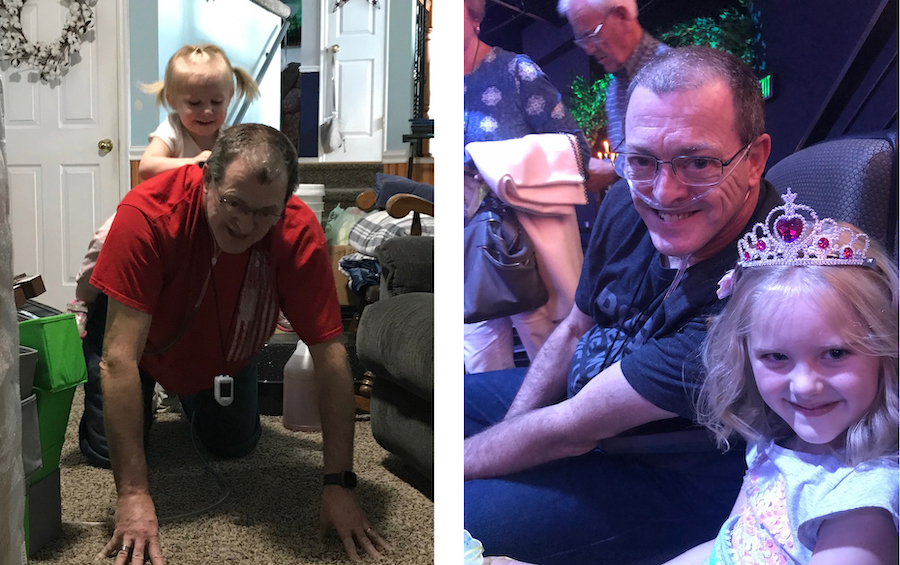
Bryan Carter
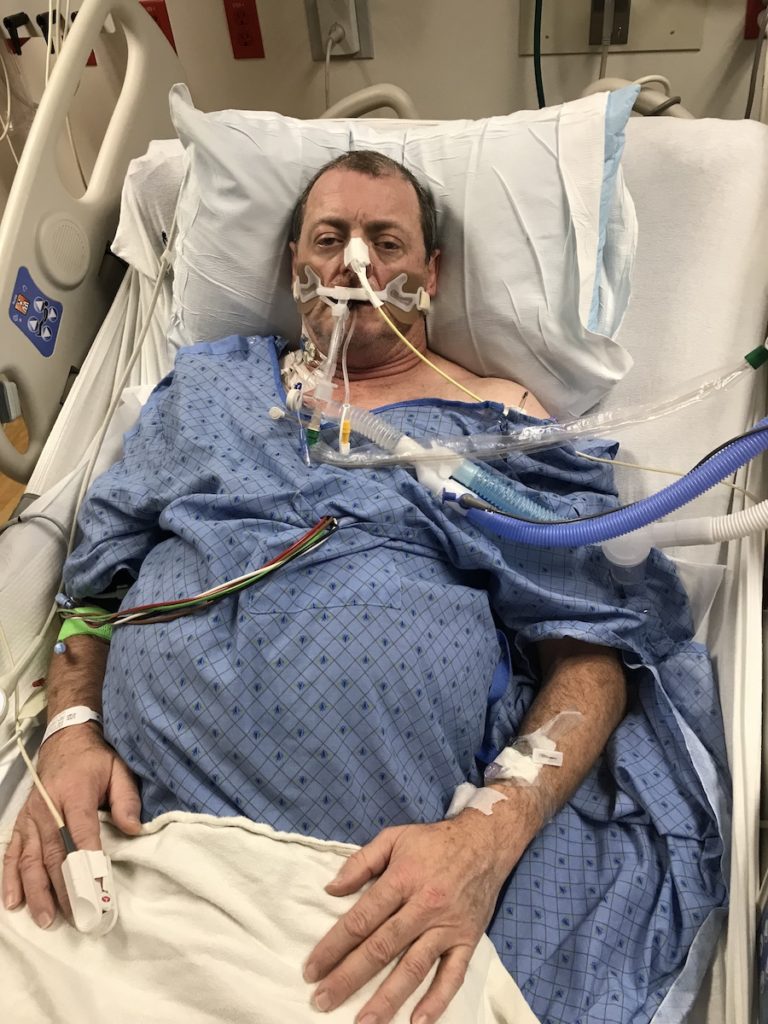
Bryan in ICU
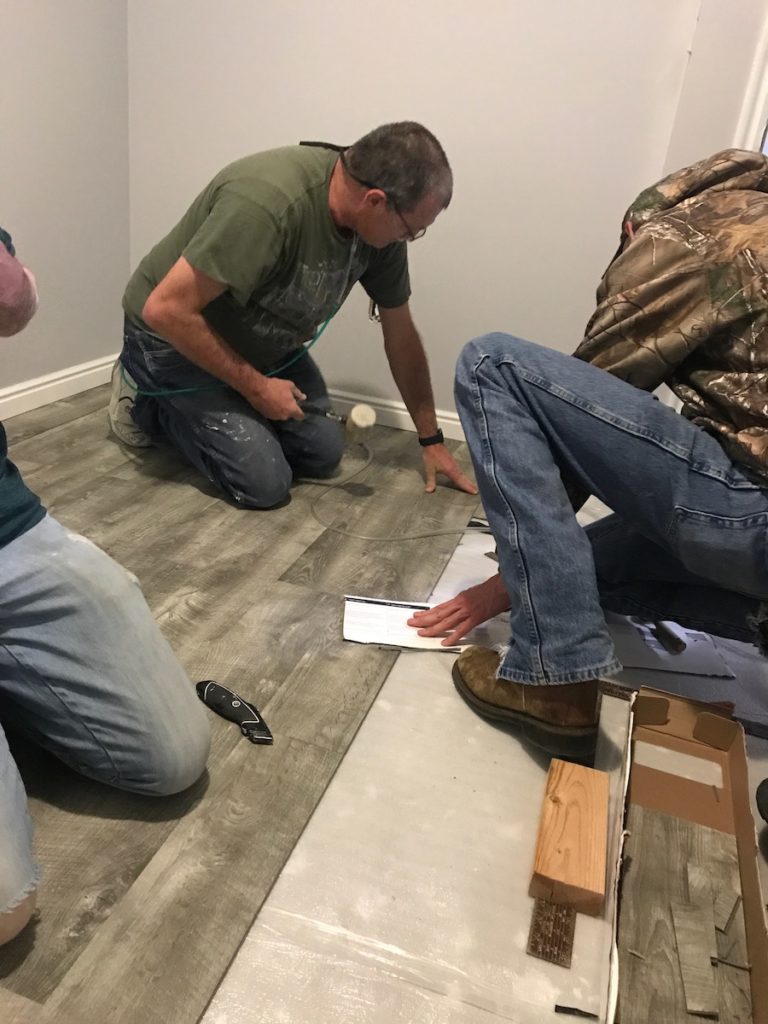
Bryan Back To Work
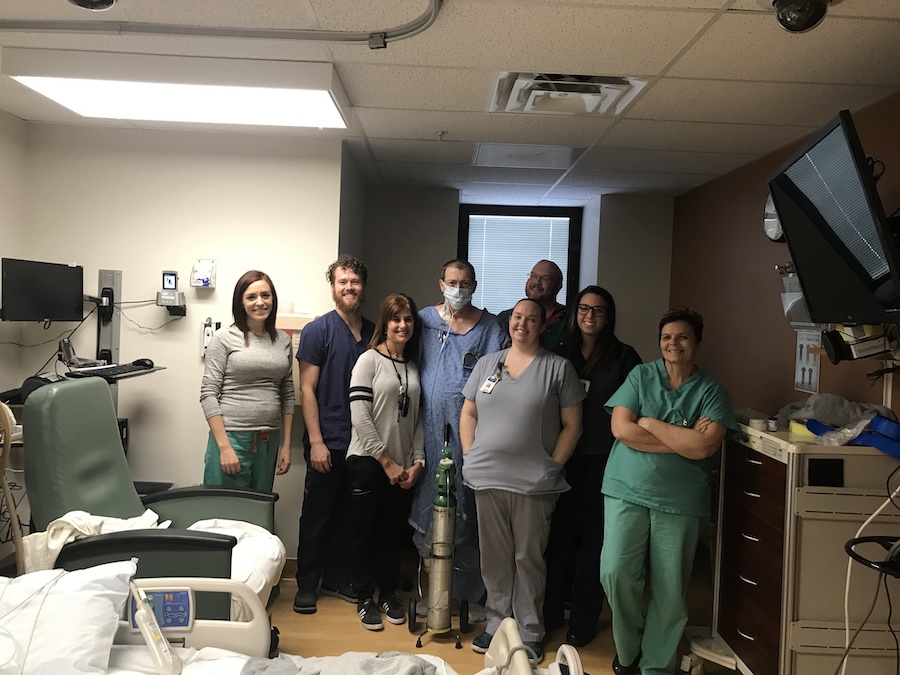
ICU Recovery Team
SUBSCRIBE TO THE PODCAST
